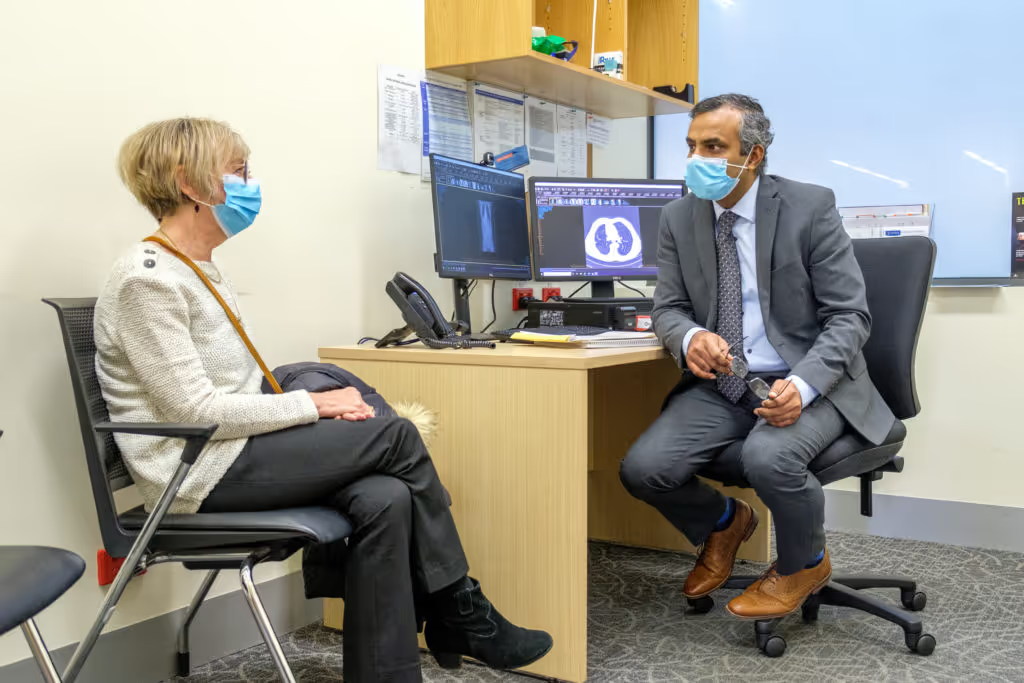The Genius of Genomics
Science Victoria Edition

By Dr Amy Nisselle and Zayne D’Crus, Melbourne Genomics
Ten years ago, Victoria launched a concerted, world-leading effort to bring genomics into healthcare. Here’s an update on how that’s going, and what it will mean for you.
Imagine your body has an instruction manual. Something the size of a thousand copies of the Lord of the Rings trilogy.
Now imagine there’s a spelling mistake in a single word, which changes its meaning. Perhaps the sentence containing that changed word no longer makes sense. In turn, a whole chapter might now read differently.
This is how genetics is often explained to people whose illnesses are caused by changes in their genes, which are the individual sentences that make up our vast instruction manual. Sometimes we inherit these changed genes from our parents; at other times, they occur spontaneously, like at conception, or when cancers form.
Genetics has long been studied in healthcare. Even before the 20th century, scientists were investigating how traits were inherited, and the earliest DNA tests began in the 1950s. Most genetic tests look at one or a few genes at a time – those that we know are linked to specific diseases. One example is cystic fibrosis, which is caused by mutations in the CFTR gene.
But now, every letter in your genome – your complete instruction manual – can be read and analysed. Not only can medical scientists detect single spelling errors, but they can also understand how these errors influence the wider text.
Sites like ancestry.com or 23andme have made the term ‘genomics’ familiar. But genomics can do more than suggest where our families came from: it can transform our healthcare, too.
Today, medical specialists can look at your DNA to diagnose rare or complex conditions, assess your risk of developing particular illnesses, and even identify what treatments are likely to succeed or fail.
Welcome to the era of genomic healthcare.

Genomics can find answers
Thousands of Victorians have now received genomic tests, with life-changing results for many.1
Four years ago, a seemingly healthy baby suddenly stopped breathing and began to have seizures. She needed resuscitation multiple times, but countless tests failed to find a reason why. A genomic test finally pinpointed the cause – a genetic variant that made her cells unable to transport vitamin B around her body. With a small daily dose of riboflavin (vitamin B2), the child returned to full health.
In another case, two brothers, who had lived for years with a mystery mix of bowel disorders and respiratory infections, were finally diagnosed through a genomic test. With the cause identified, a stem cell transplant from donated bone marrow saw the boys’ health rapidly improve.
A third example is Susan, who was diagnosed with terminal cancer in her fifties. Her tumours looked and behaved like sarcomas – but a genomic test determined they were actually melanomas. Susan received more appropriately targeted therapy, and is now cancer-free.
Professor Clara Gaff is Executive Director of the Melbourne Genomics Health Alliance, whose member hospitals provided care for the patients described above. As she explains: “Genomic testing can find answers too complex for other medical tests – all through a simple blood or saliva sample, without the need for invasive procedures like biopsies.”
Genomic testing differs from other diagnostic tests in two significant ways. First, the test results can have implications for more than just the patient involved. “People who have a known genetic condition might be thinking about having children, and want to know if they will pass the condition on,” says Professor Gaff. “Or perhaps their relatives may be able to get tested to see if they carry the same condition.”
Second, genomic data can be reanalysed. Unlike a blood test, which gives a point-in-time result, a genomic sequence can be stored and examined again as new knowledge becomes available.
Yet genomic testing has its limits. Its diagnostic capability depends on a collective body of evidence about gene changes and their ability to cause disease. Much of this evidence comes from research in Europe and North America, with populations of European ancestry – meaning that genomic testing may not be as effective for people with other backgrounds.2
Despite its emerging benefits, genomic testing is not yet provided consistently across the health system. This is due to the complexity of the test, the technology involved, and the system-wide changes needed to bring genomics into every medical speciality where it can demonstrate improved outcomes for patients.
How the world is taking on genomics
By 2018, more than AU$6 billion had been invested worldwide in bringing genomics into healthcare.3
The United Kingdom launched a national research program called the 100,000 Genomes Project in 2012, and created the NHS Genomic Medicine Service in 2018. A national test directory for genomics was released in the same year and a genomics strategy was updated in 2022.4,5
Other countries are taking similar steps to build on population-scale research, such as the All of Us program in the United States,6 and the Human Heredity and Health in Africa (H3Africa) consortium.7
National genomics programs have several common themes: establishing clinical utility and cost savings from genomics, ensuring equitable access, upgrading and standardising infrastructure, upskilling the health workforce, supporting patients to make informed decisions, and integrating the voice of consumers into service design and delivery.
Australia’s federated healthcare system requires effort at both national and state levels. Several states have their own genomics initiatives, and the Australian Genomics Health Alliance was formed in 2016 to investigate a consistent approach across all states and territories.4
Bringing genomics to Victoria
Victoria was the first Australian state to explore how to bring genomics into mainstream medicine and led the world by demonstrating where genomics outperformed other diagnostic tests.8
Ten years ago, leading hospitals, research and academic institutions committed to working together to offer genomic healthcare to all Victorians who need it. Recognising that this commitment would require significant effort across the entire health system, they formed the Melbourne Genomics Health Alliance and committed to a multi-year program of change.8
The first step, of course, was establishing an evidence base. Melbourne Genomics members offered genomic testing to thousands of Victorians childhood illnesses to cancer, kidney disease, bone marrow failure, neurological conditions, deafness and more. Genomic tests were offered side-by-side with the usual diagnostic tests these patients would have received.9
Overall, these studies showed that 19 times more patients received an informative result from genomic testing than from their usual care – and around half of those who got an answer made a change in care because of it.10 This work supported a case for nationwide Medicare funding for genomic tests for childhood syndromes, genetic kidney disease, deafness, and other conditions.11
“These studies did more than prove the benefits of genomic testing,” says Professor Gaff. “They helped us understand what was needed to bring genomics into mainstream care.”
Education was an immediate priority. Programs were designed to guide medical scientists in interpreting genetic variants, and to enable doctors to identify when and how to use a genomic test. Doctors and scientists were funded to work on genomics projects and offered fellowships in genomic medicine and research, thus creating a corps of ‘genomics champions’ across multiple specialties.12,13 Graduate programs in genetic counselling and other aspects of genomic healthcare were updated or developed.
Data management was a critical barrier to overcome. The instruction manual for a human being contains vast amounts of data; too large to be stored in electronic medical records or other software currently used in health. Doctors and medical scientists need access to genomic data to inform current and future medical decisions, while patients need to decide who sees their data and for what purpose.
Melbourne Genomics built a software platform that makes genomic data management easy, while enabling laboratories to store genomic data in the cloud. This data is stored securely, encrypted separately from any other identifying information, accessible only to the testing laboratory, and shareable with other health providers only if a patient gives their consent.14
Equitable access to genomics will be vital. Consumer representatives, including people with rare genetic conditions, provide advice on each Melbourne Genomics project.15 Meanwhile, researchers from First Nations and culturally diverse backgrounds are leading efforts to improve equity in genomics research and healthcare.16
Perhaps the hardest challenge of all is to create change in the complex world of public healthcare.
Melbourne Genomics is currently developing a framework to help hospitals make decisions about genomics. It is also testing different models for ‘mainstreaming’ genomics – making it a routine part of oncology, nephrology, paediatrics and other disciplines. These findings will inform a roadmap for embedding genomics in the health system, led by the Victorian Government.
What will this mean for Victorians?
Associate Professor Cate Kelly, former chief medical officer at The Royal Melbourne Hospital, believes that genomic testing will become routine in healthcare.
“Victoria has come so far in the last 10 years,” says A/Prof Kelly. “We have the evidence, the models, the education and the technology to embed genomics in our health system. What’s needed now is the will and shared effort to translate evidence into action and make it happen.”
The widespread availability and accessibility of genomic testing would change healthcare in many ways. Thousands of Victorians who live with unexplained medical conditions could get answers. Relatives of people with genetic conditions can find out if they are also at risk. Some childhood conditions can be detected and treated before they become life-altering. People could plan families with an informed understanding of inherited conditions.
Our health system – always under pressure to cut costs – would also benefit. Earlier diagnoses would mean patients spending less time in emergency wards and hospital beds.17 Many invasive and expensive tests could be avoided.
“This is the kind of care we would want for our children, our parents, our siblings and our friends,” says A/Prof Kelly. “Its use is only going to increase, and it’s exciting to see what will happen next.”
–
Dr Amy Nisselle is Genomics Workforce Lead, Melbourne Genomics, and an Honorary Senior Fellow at The University of Melbourne. Mr Zayne D’Crus is Communications and Engagement Manager, Melbourne Genomics.
Dr Nisselle’s research and practice focus on genomics education for students, professionals and the public. She has a doctorate in multimedia genetic education and is a keen science communicator. Zayne D’Crus is a communications specialist for topics ranging from healthcare to international humanitarian law.
References:
- Melbourne Genomics Health Alliance. Genomics in Victoria: What’s changed in 10 years? melbournegenomics.org.au/news-and-media/10-years (Accessed 16/11/23)
- Fatumo, S., et al. (2022). A roadmap to increase diversity in genomic studies. Nature Medicine, 28(2), 243–250. doi.org/10.1038/s41591-021-01672-4
- Stark, Z., et al. (2019). Integrating Genomics into Healthcare: A Global Responsibility. The American Journal of Human Genetics, 104(1), 13–20. doi.org/10.1016/j.ajhg.2018.11.014
- NHS England» National Genomic Test Directory. (2018, August 3). NHS England. england.nhs.uk/publication/national-genomic-test-directories/
- NHS England» Accelerating genomic medicine in the NHS. (2022, October 12). NHS England. england.nhs.uk/long-read/accelerating-genomic-medicine-in-the-nhs/
- All of Us Research Program, National Institutes of Health, allofus.nih.gov/ (Accessed 19/9/23)
- Human Heredity and Health in Africa (H3Africa), h3africa.org/ (Accessed 19/9/23)
- Gaff, C. L., et al. (2017). Preparing for genomic medicine: a real world demonstration of health system change. NPJ Genomic Medicine, 2(1), 1–9. doi.org/10.1038/s41525-017-0017-4
- Comparative studies are available at melbournegenomics.org.au/studies-and-evidence
- How genomics helps Victorians. (n.d.). Melbourne Genomics. Retrieved November, 2023, from melbournegenomics.org.au/genomics-explained/how-genomics-helps
- Evidence cited in applications to the Medical Services Advisory Committee.
Childhood syndromes (msac.gov.au/internet/msac/publishing.nsf/Content/1476-public);
Cardiomyopathy (msac.gov.au/internet/msac/publishing.nsf/Content/1599-public);
Deafness (msac.gov.au/internet/msac/publishing.nsf/Content/1680-public);
Renal conditions (msac.gov.au/internet/msac/publishing.nsf/Content/1600-public). - Maher, F., et al. (2023). Genomics education for medical specialists: case-based specialty workshops and blended learning. doi.org/10.20517/jtgg.2023.04
- Martyn, M., et al. (2021). “It’s something I’ve committed to longer term”: The impact of an immersion program for physicians on adoption of genomic medicine. Patient Education and Counseling, 104(3), 480–488. doi.org/10.1016/j.pec.2020.10.013
- What is Genomical? (n.d.). Genomical. Retrieved September 19, 2023, from genomical.com.au/about-genomical/what-is-genomical/
- Wale, J. L., et al. (2021). Making community voices heard in a research-health service alliance, the evolving role of the Community Advisory Group: a case study from the members’ perspective. Research Involvement and Engagement, 7(1). doi.org/10.1186/s40900-021-00326-6
- For example, the Australian Alliance for Indigenous Genomics (ALIGN), an Indigenous-led consortium formed to ensure that Aboriginal and Torres Strait Islander peoples explicitly benefit from genomic medicine. indigenousgenomics.com.au
- Stark, Z., et al. (2019). Does genomic sequencing early in the diagnostic trajectory make a difference? A follow-up study of clinical outcomes and cost-effectiveness. Genetics in Medicine, 21(1), 173–180. doi.org/10.1038/s41436-018-0006-8
Discover how you can join the society
Join The Royal Society of Victoria. From expert panels to unique events, we're your go-to for scientific engagement. Let's create something amazing.




















